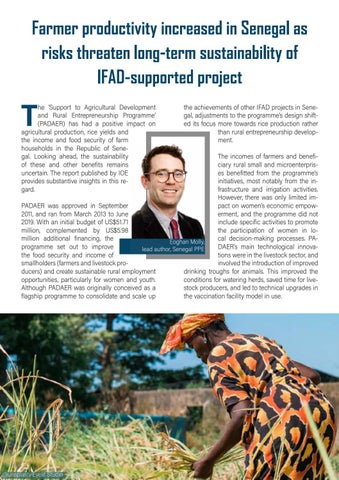Farmer productivity increased in Senegal as risks threaten long-term sustainability of IFAD-supported project
T
he ‘Support to Agricultural Development and Rural Entrepreneurship Programme’ (PADAER) has had a positive impact on agricultural production, rice yields and the income and food security of farm households in the Republic of Senegal. Looking ahead, the sustainability of these and other benefits remains uncertain. The report published by IOE provides substantive insights in this regard.
the achievements of other IFAD projects in Senegal, adjustments to the programme’s design shifted its focus more towards rice production rather than rural entrepreneurship development.
The incomes of farmers and beneficiary rural small and microenterprises benefitted from the programme’s initiatives, most notably from the infrastructure and irrigation activities. However, there was only limited impact on women’s economic empowPADAER was approved in September erment, and the programme did not 2011, and ran from March 2013 to June include specific activities to promote 2019. With an initial budget of US$51.71 the participation of women in lomillion, complemented by US$5.98 cal decision-making processes. PAmillion additional financing, the Eoghan Molly, DAER’s main technological innovaprogramme set out to improve lead author, Senegal PPE tions were in the livestock sector, and the food security and income of involved the introduction of improved smallholders (farmers and livestock prodrinking troughs for animals. This improved the ducers) and create sustainable rural employment conditions for watering herds, saved time for liveopportunities, particularly for women and youth. stock producers, and led to technical upgrades in Although PADAER was originally conceived as a the vaccination facility model in use. flagship programme to consolidate and scale up
48 @unsplash/Eyelit Studio













